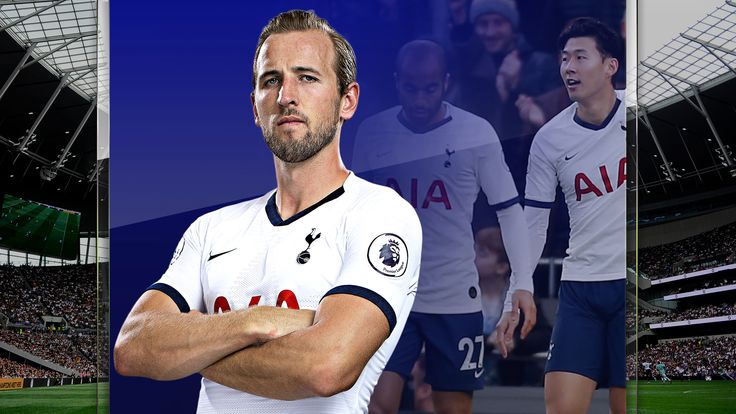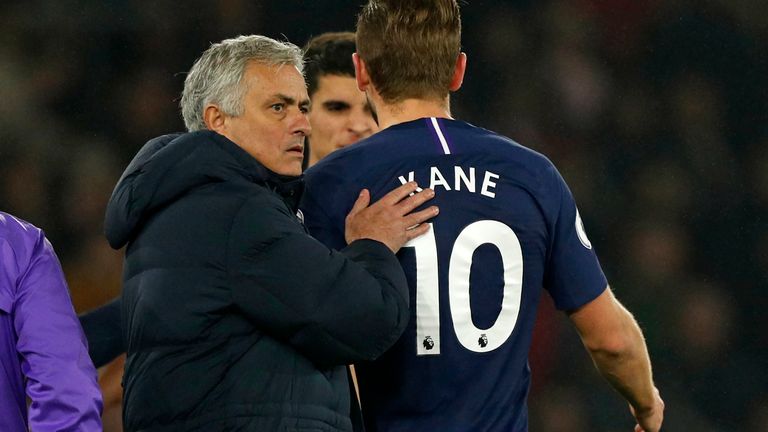Harry Kane's injury is a problem for Jose Mourinho’s style of play
Harry Kane's absence will hurt Tottenham more because of Jose Mourinho's style of play, writes Adam Bate.

Monday 6 January 2020 14:10, UK
Tottenham's first game since Harry Kane's hamstring injury was not a triumph. The team has actually performed well without their star striker in the past, once winning eight consecutive games across two seasons when he was unavailable.
But Kane's absence is likely to prove a much bigger problem for Jose Mourinho than it did for Mauricio Pochettino.
In Tottenham's 1-1 draw away to Middlesbrough in the third round of the FA Cup on Sunday, Mourinho went with Lucas Moura and Heung-Min Son but lamented the loss of his target man. "It's a new thing for the team to play without Harry, without a striker," he said. "We tried to give them the mobility of Son and Lucas, but it was not easy."
He added: "The boys did what they can. You cannot transform Lucas or Son into a number nine like Harry Kane. So we have to try other things and that is what we are going to do."
Mourinho talked of how, by the end of the game, Spurs were playing "with six attacking players but without a striker" and explained why this was such an issue. "We were without a target man to be in positions where we could organise our game with that point," he said.
His analysis of the situation was correct, of course, but it hampers Mourinho more than some of his peers because, while the personnel changed, the approach did not. Spurs continued to play longer passes and too often it was too easy for Boro to repel them. A total of 56 long balls against a Championship side certainly felt a little too many.
This appetite to go long has been a developing issue under Mourinho. It was there to see in the defeat to Southampton on New Year's Day even prior to Kane's injury in the second half.
Indeed, Jan Vertonghen made reference to it afterwards. "First half, we had to play more," said the defender, quoted in the Evening Standard.
"There was the possibility to play, but we used long balls too quick."
Given that Vertonghen himself hit 19 of those long balls - more than any other player on the pitch - the source of those comments might come as a surprise to Spurs supporters but the assessment was still accurate. The statistics show that the number of long balls that Tottenham have been playing has gone up markedly since Mourinho's arrival.
Sometimes it has worked. The game in which Spurs have played the fewest number of long balls this season was the home defeat to Newcastle, perhaps the worst result of the campaign. The most long balls came in the 5-0 win over Burnley, their biggest victory.
This is not about right and wrong, it is about a discernible shift in style under Mourinho and its consequences. The advanced data collected by Opta reveals that this is not just about long balls. It is part of an overall trend since his appointment in November.
Tottenham are having fewer sequences of 10 or more passes and so the number of shots that have come as a result of those long build-up attacks have decreased too. They have looked to hit the ball up to Kane that little bit earlier and then play from there.
There is no reason why Spurs cannot make that work for them when Kane is in the team. The England captain has many facets to his game and so has the capacity to adapt to a number of different styles. He can press or pass, run onto the ball or hold it up.
Mourinho likes his strikers to provide the attacking pivot, giving the team a foothold in the final third. The idea is that Dele Alli and the wide forwards can then play off him.
While other Premier League coaches have looked for different qualities in their central striker, Mourinho has always favoured the target man. He won the title with Didier Drogba and Diego Costa in the role. He brought in Zlatan Ibrahimovic and Romelu Lukaku at Manchester United. For him, it is an essential element of a successful Premier League team.
Upon signing Lukaku in the summer of 2017, he explained: "Everybody knows he's a striker so we're not speaking about a multi-functional player or going to create doubts about positions on the pitch. He's a striker and normally strikers score goals.
"For the characteristics of the Premier League we need a target man, which is not [Anthony] Martial, [Marcus] Rashford. The clear nine, the one that is comfortable to play in the box and the defensive line we thought Romelu would be a good option for us."
The idea that Rashford could not fulfil this same role in the side was a theme that Mourinho has since returned to even since his departure from Old Trafford. He explained his thinking during an appearance on Sky Sports earlier this season.
"He is not a target man, he is a man of movement," he said. "I do not think he is a pure nine. For me he is potentially a very good player, in some models and in some positions. As a number nine I don't think he has the 30 goals a season in him. I don't think he can get better as a target man. To be better as a target man is difficult for him."
Will it prove difficult for Son and Lucas too if asked to take on striking duties in a Mourinho team?
Kane was able to make the adjustment and, in truth, it was probably the direction in which his game was trending anyway. The body has filled out a bit and he is slightly less suited to running the channels than he once was. The number of aerial duels that Kane contests had been steadily increasing already - before rising significantly under Mourinho.
That's part of the remit now but can Tottenham play that way without Kane? Mourinho must find a way, even though it goes against his instincts about how to construct a team. One suspects that he would have been happier if Fernando Llorente had still been around to help.
Instead, the only solution available to Mourinho is to put another attacking midfielder on the pitch. For another manager, given Tottenham's strength in that area of the pitch, that would bring with it exciting possibilities. For Mourinho, it is a problem.
Next up? Liverpool.







